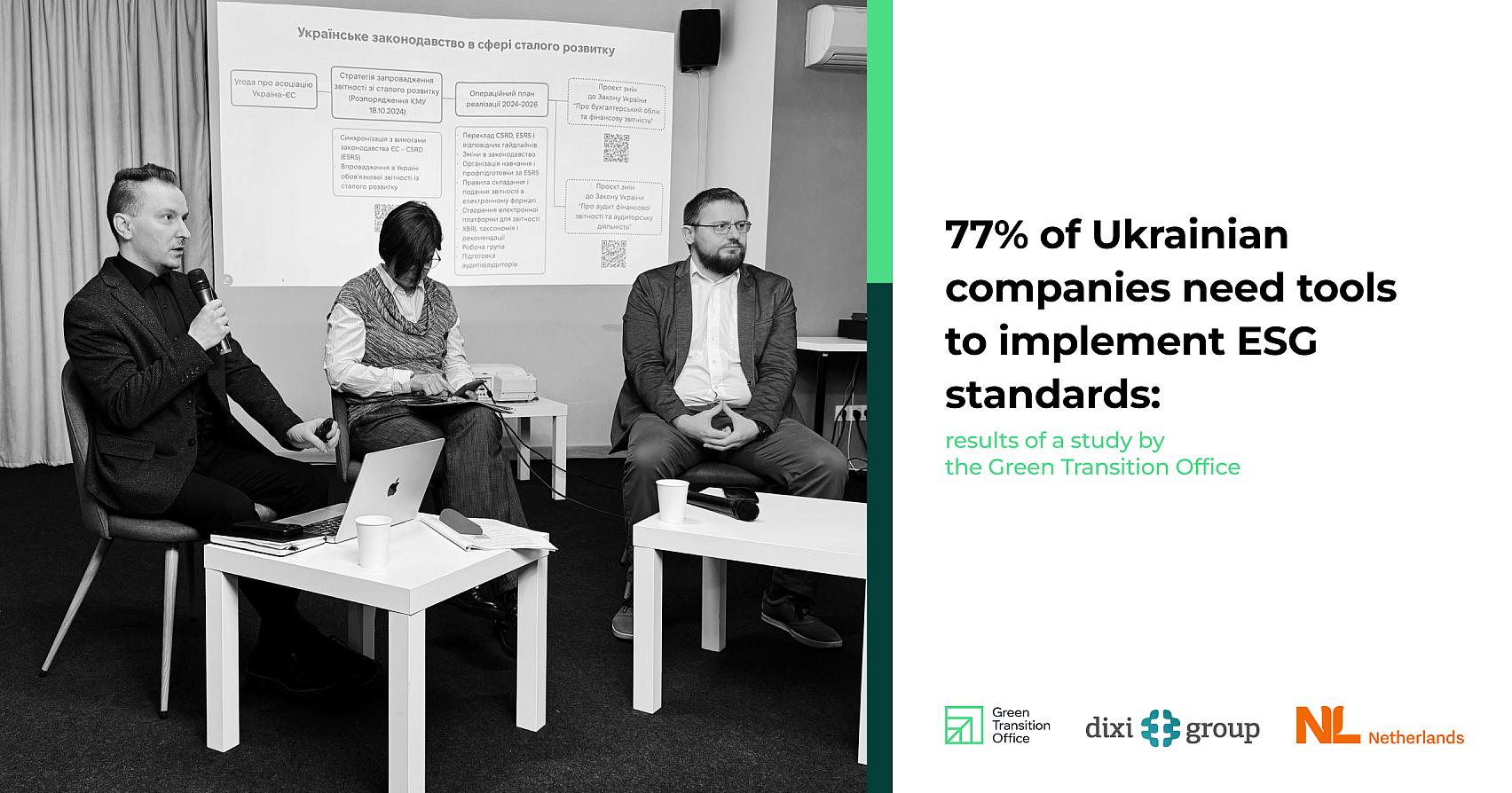77% of Ukrainian Companies Need Tools to Implement ESG Standards: Results of the Green Transition Office Study
A study by the Green Transition Office, conducted among representatives of Ukrainian companies across various economic sectors, revealed a paradoxical situation: almost three-quarters of Ukrainian enterprises consider themselves sustainable, yet only one in six companies truly understands what this means.
The study results demonstrate another interesting phenomenon – although only a small percentage of companies (about 7-9%) are well-informed about international ESG standards, the majority of Ukrainian businesses (over 87%) support their implementation. This indicates a high level of openness to change, despite limited knowledge in this area.
"We found that the main problem in implementing ESG is not resistance or lack of interest from businesses, but a lack of practical knowledge and tools. At the same time, we established that 77% of Ukrainian companies consider the shortage of qualified personnel and insufficient competence of current employees to be the biggest obstacle to implementing ESG approaches," emphasized Oleksii Yatsiuk, ESG expert at the Green Transition Office, during the presentation of the study.

Main barriers to ESG transformation
The study identified a complex of interconnected challenges that hinder ESG transformation in Ukraine. Three-quarters of surveyed companies note the lack of clarity in legislation – both Ukrainian and European – as one of the key barriers. Additionally, almost the same number of respondents (77%) point to a shortage of qualified personnel as a significant obstacle.
About 71% of companies complain about the lack of accessible information regarding the implementation of standards and ESG reporting. Technological aspects also create considerable difficulties: more than two-thirds (68%) of companies recognize the collection and processing of large data sets as problematic, and 65% are concerned about the need to use specialized software.
The need for systemic changes
Implementing ESG standards requires not only technical solutions but also profound structural changes. The study showed that almost two-thirds (63%) of Ukrainian companies recognize the need for significant restructuring of business processes for successful ESG transformation. At the same time, about 67% of respondents are concerned about potential additional costs for maintaining appropriate reporting.
These results indicate that ESG transformation requires a comprehensive review of operational models, supply chains, production processes, and decision-making systems in companies. This points to the need for a strategic approach to implementing ESG practices, not just "cosmetic" changes in business activities.
Readiness of Ukrainian business for change
Despite the identified gaps, Ukrainian business demonstrates an impressive level of readiness for transformation. The majority of respondents (87%) have a positive attitude toward implementing ESG standards, and almost half (44%) declare their readiness to submit relevant reports in the first year after the introduction of such norms.
Ukrainian companies also demonstrate an understanding of the key elements of successful transformation. About 89% are confident that employee training will significantly improve their readiness for ESG challenges. In parallel, 87% expect that the implementation of digital solutions will significantly simplify the reporting process. It is important to note that a similar percentage (86%) support the idea of a phased introduction of standards with a possible transition period, which indicates a pragmatic approach to transformation.
Recommendations for stakeholders
Based on the study results, the Green Transition Office has developed a series of practical recommendations. Businesses are advised to actively invest in staff training, create effective systems for data collection and analysis, and integrate sustainability principles into their corporate strategy in advance. This approach will help companies not only formally meet requirements but also gain competitive advantages in the market.
The experts recommend that government bodies review the deadlines for mandatory implementation of ESG reporting taking into account the identified challenges, develop supporting digital infrastructure, and stimulate the creation of quality professional training programs. Special attention needs to be paid to harmonizing Ukrainian legislation with European requirements to provide companies with clear guidelines for transformation.
View the Green Transition Office presentation at:
https://drive.google.com/file/d/12XQyTNtVlQ6fCtoAUwpp-r4XgryTwUPa/view?usp=sharing
About the study: Conducted by InfoSapiens in January-February 2025 among small, medium, and large enterprises in Ukraine (from 11+ employees, turnover from 40 million UAH). Methodology: 420 telephone interviews, 20 in-depth interviews with large businesses, and 4 focus groups with SME representatives. Respondents - owners, managers, and individuals responsible for sustainable development projects.

The presentation of the agency that conducted the research can be viewed at:
https://drive.google.com/file/d/1cr1we3JGEu08il_aKSBWxbhr47dPuYJo/view?usp=sharing
View the recording of the event at:
https://youtu.be/IP1subkjQfg
The Green Transition Office is an independent advisory body to the Ministry of Economy of Ukraine, which helps implement reforms in the field of green transition, energy and climate policy of Ukraine. The Green Transition Office operates with financial support from the British Agency for International Development and is implemented by the NGO "DIXI GROUP."
The study was implemented within the framework of a project supported by the Ministry of Foreign Affairs of the Kingdom of the Netherlands and is implemented as part of the Private Sector Development Program of the Netherlands Enterprise Agency (RVO.nl).
Published on

